Photographs: Ibraheem Abu Mustafa/Reuters
The Indian Independence Movement stands as one of the earliest examples of non-violent political resistance to foreign occupation. On August 15, 1947, India gained emancipation from the British and Mahatma Gandhi, was a guiding force in this struggle. The Mahatma was an idealist but he was also a strategist and a political visionary. His actions gained the attention of the world and stand as a challenge to those who propound the efficacy of violent resistance today.
But there is a dearth of practical examples that utilise Gandhian principles in contemporary politics. Can Gandhian principles be put into practice in one of the leading political struggles of today? Can we create a road-map for non-violence in the Palestinian struggle against Israeli occupation?
In order to get a Palestinian perspective on the issue, Gitanjali Bakshi spoke to Ziad Abu Zayyad, founder of Middle East Post, an influential blog in the region. Ziad articulates the Palestinian youth perspective. He is the president of the Watan student movement at Hebrew University in East Jerusalem. He writes on the conflict on his blog. Ziad's views are pertinent because he represents the future of the Israel-Palestine struggle.
'Resistance through violent means has hurt the Palestinian cause'
Image: Palestinian women sit before a mural of portraits of Palestinians killed during the 'Intifada al-Aqsa', or Palestinian uprising against Israeli occupation, as they attend a rally marking the anniversary of the establishment of the Palestinian fundamentalist movement Hamas.Photographs: Reuters
Organisations like Hamas have said that resorting to non-violent methods like the negotiation process with Israel has been unsuccessful in the past, leading to a worsening of the situation on the ground. Do you see instances in history where resistance through violent means has hurt the Palestinian cause both physically and ideologically?
I do not think that the negotiation process can be considered a form of resistance. A Palestinian resistance movement existed before the Oslo Accords. At that time Palestinians were working toward a certain agenda -- specifically to oblige Israel into admitting that the Palestinian people had certain inherent rights. After signing the Oslo Agreement however, true Palestinian resistance petered out and more attention was given to establishing and building the institutions of the Palestinian Authority, even though this authority lacks any kind of control on the territories that were supposedly returned to it.
So in my opinion, the Palestinian Authority, specifically Fatah dropped its resistance program, whether non-violent or violent, after signing the Oslo Accords. This in turn opened the path for Hamas and other Palestinian resistance movements that continue to fight the occupation through means that they deem fit.
I agree that resistance through violent means has hurt the Palestinian cause, especially ideologically. The Israeli administration has used these violent acts to convince the world that the Palestinians are simply acting like any other terrorist organisation and this has caused irreparable damage to the Palestinian case.
People have forgotten about the Palestinians' right to live independently and their struggle towards freedom. Of course, there are physical repercussions of resorting to violent means as well. The separation wall, the imprisonment of thousands of Palestinians and economic penalties imposed by Israel have not just hurt the Palestinian cause but have made everyday living impossible.
'Non-violent protest will garner international understating to our cause'
Image: A file photograph from April 15, 1988, shows a Palestinian boy looking at an armed Israeli border policeman in the Old City.Photographs: Reuters
Would you agree that non-violent protest or civil disobedience was used in the First Intifada? In your opinion, was this an effective tool in the Palestinian struggle for statehood?
The whole idea behind the First Intifada was based on staging a non-violent protest and civil disobedience. I do believe that this is the only real and effective way to bring about a reorganisation of the Palestinian cause and again garner international understanding for our motives. During the First Intifada, Israel was embarrassed in the international community and it also faced internal pressure from its own people to end the occupation. The world realised that millions of Palestinians were being held under terrible circumstances and were basically forced to live under a military regime.
The Palestinians should reconsider violent resistance and concentrate on non-violent methods in order to create a similar kind of pressure on Israel and convince the world again that we are a people who demand independence and are not related to terrorism in any way. International law, the Human Rights Charter and prior United Nations agreements admit our right to demand this and Palestinian violence only in stealing these rights from us.
It is also important to remember that the situation in the West Bank and the Gaza Strip is completely different today. Most of the Palestinian movements are not using violence at all. It is also important to differentiate between a suicide attack and Palestinian armed resistance, which acts to defend Palestinian civilians when the Israeli army attacks cities and villages such as in the January 2009 war on Gaza.
Are there examples of events and movements in the Palestinian struggle for statehood that exemplify Gandhian principles of non-violence? Who was Mubarak Awad? Can you see a Palestinian leader today who could follow the precepts of non-violent resistance?
I believe that President Mahmoud Abbas propounds a peaceful solution to the Palestinian dilemma. President Abbas has stated several times that only non-violent resistance and negotiations are the right way to regain Palestinian rights. However, he is facing real challenges today because despite his efforts, Israel continues to refuse any kind of compromise. Abbas has worked hard to collect illegal weapons from the territories and has even imprisoned armed Palestinian men, but his actions have not brought about any tangible results and he has lost the people's support.
The problem is that the occupied Palestinian Territories are not considered a separate entity in the eyes of Israelis. In the Indian independence struggle, the foreign occupier had a homeland to return to. The Israeli-Palestinian conflict is different since some important Israeli factions believe that it is their right to live in any inch of the historical land of Palestine. A clear example of this conviction is Prime Minister Benjamin Netanyahu's refusal to freeze settlement building in the West Bank. The Zionist ideology refuses to withdraw from any part of the occupied territories and considers it a duty, ordered by God, to continue to hold this land.
Having said that, I do believe that Gandhi's principles and a non-violent movement are the last chance we have to accumulate international pressure on Israel, to give the Palestinians their rights. Mubarak Awad is a Palestinian who, for a while, was named the Arab Gandhi. He tried to implement Gandhi's principles in the Palestinian resistance movement and although he did some great work, he did not succeed in changing the Palestinian ideology. Israelis and Palestinians are so consumed by anger and revenge, that they have come to believe that force is the only way to make the other side surrender.
'Palestinian civil disobedience is ignored by the media'
Image: A Palestinian holds his rifle near photographs of then US President George W Bush and then Israeli Prime Minister Ariel Sharon, with 'terrorist' written on them, during a demonstration in the Gaza Strip on November 18, 2005.Photographs: Mohammed Salem/Reuters
According to the Israeli author Neve Gordon, Palestinians have been engaging in acts of civil disobedience but the, 'world knows very little about these acts. A simple Google search with the words 'Palestinian violence' yields over 86,000 pages, while a search for 'Palestinian civil disobedience' generates only 47 pages'. Do you agree with this statement? Can this lack of knowledge be attributed to the disinterest of the media, the lack of cohesive Palestinian support for non-violent resistance or both?
Palestinian acts of civil disobedience are completely ignored by the media. There is truth to this claim and we must realise that there are often strategic motives behind this. Quite often Israel will represent its perspective of events and it simply has better media sources and support for what it wants the world to see. Israeli officials have also used the media in the past, to misrepresent Palestinian resistance.
I still remember Ariel Sharon's speech which was made shortly after the September 11 attacks on the US. Sharon stated clearly that Israel's conflict with the Palestinians is not different from the world's fight against terrorism. In effect, this one statement seemed to change the cause of more than 7 million Palestinians who suffered from racism, occupation, imprisonment, and expulsion from their homeland and turned the Palestinian struggle into a case of terrorism. In all honesty, this statement got better exposure from the media while non-violent Palestinian resistance is often ignored.
Gandhi used the 'salt march' as a universal symbol that united all Indians under one banner, irrespective of their caste, creed or religion. What symbol can Palestinians use to unite in a mass non-violent protest that would grab the world's attention as the march to Dandi did on March 13, 1930.
The Palestinians need something to unite them because only in their unity can they find a common program which will bring them freedom. The division between Hamas and Fatah has caused severe damage to the Palestinian struggle. The olive tree has always been a strong symbol of freedom, liberty and the right to earn an independent livelihood. This can be used as a symbol of inspiration like the spinning wheel was used in the Indian independence struggle. Resistance against the separation wall of course, has proven to be a legal and peaceful means to a united Palestinian and Israeli front against the occupation.
'The Palestinian people should have Gandhi's power to forgive'
Image: (Left) Arun Gandhi, the grandson of Mahatma Gandhi, writes graffiti on the concrete wall, part of the controversial Israeli security barrier, near the West Bank town of Tulkarm on August 28, 2004. (Right) Then Israeli Foreign Minister Silvan Shalom places a wreath at the Mahatma Gandhi memorial at Rajghat in New Delhi on February 11, 2004.Photographs: Mustafa Abu Dayha and Kamal Kishore/Reuters
Finally, do you think that Palestinians can gain a two-state solution through non-violent means? If so what do they require in order to achieve this goal?
I believe one day the Palestinians will gain their right to a state of their own. The thousands of people who have been killed in this conflict will compel both sides to end hostilities. The Palestinians have the right to live independently and with dignity but they can achieve this only through unity, determination, and organised work. Then the world will understand their cause and support its realisation.
A genuine intention for peace, from both sides, is the central factor which may resolve this conflict. Today I see the Palestinians changing dramatically, although they are still not completely united. The Palestinian people do not wish to continue fighting because they simply want to fight. There is a goal at the end of the tunnel that can be achieved by not forgetting the past but forgiving. We entered the United Nations holding an olive tree branch in one hand and a gun in the other. We told the world that we are coming with true intentions for peace, so do not oblige us to use the gun anymore. I do believe that Gandhi had an unwavering faith in the power of non-violent resistance but he also assured his people that self defence is a right of every human being.
Gandhi said: "I cannot teach you violence, as I do not myself believe in it. I can only teach you not to bow your heads before any one even at the cost of your life." I wish that one day the Palestinian leadership and people will be able to have Gandhi's power to forgive and believe that even when they are being killed and occupied, they can still defend themselves by believing in their cause. If they face their enemy with peace and a demand for freedom, they will never feel that they are surrendering.
Gitanjali Bakshi is a research analyst at Strategic Foresight Group, a political think tank based in Mumbai. She specialises in Middle-East politics with a focus in conflict resolution.

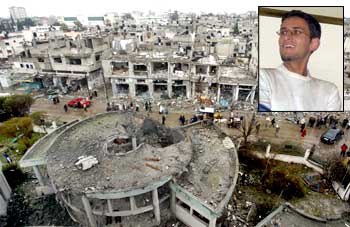
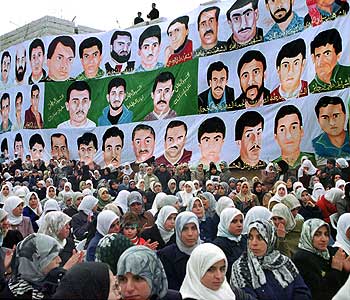
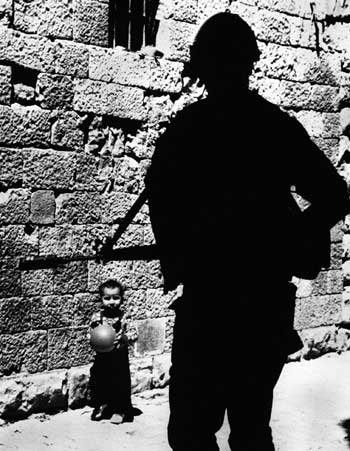
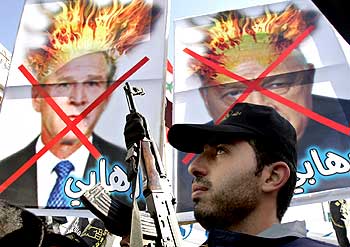
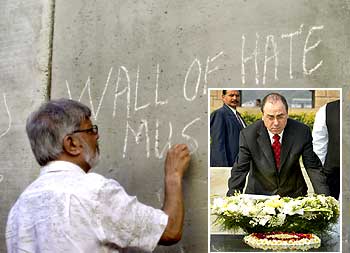
article